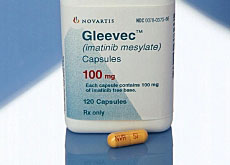NGOs attack Novartis over drug access

Swiss medical and non-governmental organisations (NGOs) have appealed to pharmaceutical giant Novartis to call off a legal challenge to India's patent law.
They say that if the Basel-based company is successful it could have serious implications for future access to essential drugs around the world.
Novartis says it is simply defending its intellectual property rights and has no intention of backing down.
It has launched separate legal proceedings in India over the past two months. One concerns Indian compliance with World Trade Organization (WTO) rules on intellectual property; the other is an appeal against the rejection of its patent application for the cancer drug Glivec.
Campaigners in Switzerland, led by NGO the Berne Declaration, say they are extremely concerned by the firm’s attempt to overturn a section of Indian law that does not allow patents for minor improvements to known substances.
They claim this would remove a key safeguard protecting the production of affordable medicines and say the action goes against the spirit and letter of a WTO declaration on public health, which grants governments a degree of flexibility on intellectual property.
“With this challenge, Novartis is seeking to limit the ability of the Indian government to take measures to protect the public health of its population and to have a patent system adapted to the Indian socio-economic context,” states an open letter from campaigners to the company’s chairman and CEO Daniel Vasella.
“We are very concerned that the changes sought by Novartis in the Indian Patents Act could negatively affect access to essential generic medicines (in particular HIV/Aids medicines) not only in India but also in all the developing countries that import Indian generic medicines.”
Generic drugs
According to medical charity Médecins Sans Frontières (MSF), India is a major source of affordable generic medicines. Four out of every five Aids drugs used by MSF to treat thousands of patients in over 30 countries are generics from India.
Regarding Glivec, also known in the United States as Gleevec, campaigners say the annual cost of treatment with the life-saving drug – around $25,000 (SFr32,000) – is too expensive for patients in developing countries.
The letter, signed by the Berne Declaration, has been backed by a number of groups including the Swiss Aids Federation, the Swiss Cancer League and Médecins Sans Frontières Switzerland.
Former Swiss cabinet minister Ruth Dreifuss, who is chairman of the World Health Organization’s Commission on Intellectual Property Rights, Innovation and Public Health, is also supporting the campaign.
Cost factor
Responding to the letter, Novartis said that generics were not the answer for the majority of patients in India who are still unable to afford them.
“Generics will not solve the issue since the price of generics is still four to five times higher than the average salaries of people in India,” spokesman John Gilardi told swissinfo.
“It’s important that we applaud the efforts India has made to improve its intellectual property protection, but this is about ensuring that a patent for Glivec, which is recognised in over 40 countries, is also recognised in India.”
Gilardi added that more than 99 per cent of patients in India in need of Glivec were getting the drug free of charge. He said that those who were not receiving the drug should apply to Novartis’s Glivec programme.
Regarding Indian patent law, Gilardi said this clearly exceeded the parameters set out under WTO rules on intellectual property.
“People underestimate the challenges of creating new drugs, bringing them on to the market and the costs involved. Without a reward for innovation, there will be no innovation,” he said.
“There’s no faster way to kill access to the latest life-saving drugs for people in India than to avoid offering patent protection.”
swissinfo, Adam Beaumont in Geneva
NGOs say generic versions of Glivec are one tenth the price.
They say there are 25,000 new cases of chronic myeloid leukaemia in India every year.
An Indian court rejected Novartis’s Glivec patent application in January 2006.
Novartis launched Glivec, which halts the spread of cancer cells related to the blood disease chronic myeloid leukaemia, five years ago.
The product earned more than $2.1 billion (SFr2.67 billion) in 2005, with sales increasing by a third.
Since early 2002 Novartis’s Glivec International Patient Assistance Program has provided the treatment free of charge in 79 countries to more than 13,600 patients who otherwise would not have had access to the drug.

In compliance with the JTI standards
More: SWI swissinfo.ch certified by the Journalism Trust Initiative










You can find an overview of ongoing debates with our journalists here . Please join us!
If you want to start a conversation about a topic raised in this article or want to report factual errors, email us at english@swissinfo.ch.